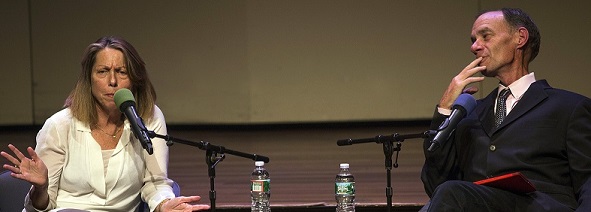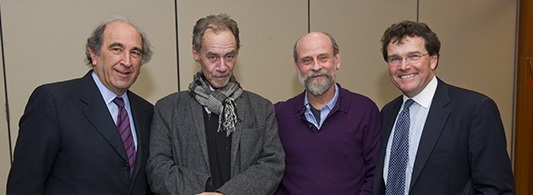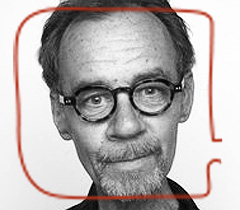By Michelle Marino
MS Journalism ’15
BU College of Communication
“Switch to something forward-looking, like blacksmithing,” David Carr teased, breaking the ice on his outlook for journalism at his much anticipated Fast Forward event. The event, which also included his former New York Times executive editor Jill Abramson, was equal parts laid back and engaging. It kicked off by Carr fielding a few brief questions on the future of journalism and the media with WBUR & NPR’s Here & Now co-host Jeremy Hobson.
Carr went on to explain there is a place in journalism for people who can create a concise piece of work and effectively distribute it to the right audience. When asked about the future of media, he didn’t make outright predictions but touched on issues facing print, the trouble of being a mid-sized publication, the declining influence of cable news and the transformation of newspapers to daily magazines. Talking about change, he explained how it usually comes very slowly, and then all at once. He likened print to intellectual jewelry, saying, “In 10 years, print will be a luxury artifact – web will be the primary vehicle.” He also discussed the importance of curation and the organization of news in a world of relentless information and content personalization.
Carr then took over as host, with Jill Abramson joining him onstage. The dynamic between the two was casual and jovial. The conversation flowed freely and without formality, Carr often probing and Abramson answering. Topics ranged from Ebola to the American Dream to the current generation. Carr calls worrying about successive generations a “waste of time”, saying “This generation is serious…we’re just pot smokers.”
Abramson was forthcoming on her career with the Times, saying “I devoted my career to telling the truth and the truth is I’m fired!” She said she misses the chase of being in the thick of the news, but she is enjoying her new role as a professor at Harvard. Much to everyone’s surprise, she nonchalantly dropped the news of a startup she is pitching with journalist Steven Brill, which will have her writing one long-form story annually. On news competition, she says she ceased thinking of other news organizations, as competition is coming from everywhere.
In closing, Abramson shared the best advice she ever received related to journalism: “Shut up and listen.” It was eye opening and entertaining to watch two of media’s most influential players bat ideas around and gain valuable insight.
Boston University is lucky to have Carr as a professor here at the College of Communication. Next semester, he’ll be teaching Media Criticism JO500. If you’re interested in joining Professor Carr’s class, you can apply by critiquing a piece of media content in any medium you like. In the meantime, Abramson will continue to pursue her startup. So, shut up and stay tuned!
To find out about more events going on at BU’s College of Communication, check out the calendar here.



